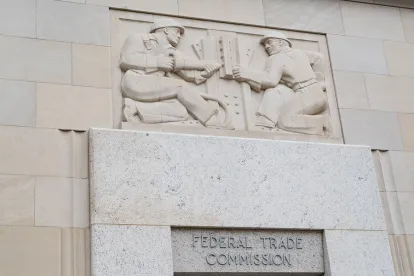On June 11, 2021, the U.S. Court of Appeals for the Second Circuit dismissed the Federal Trade Commission’s (FTC) administrative order against 1-800 Contacts, Inc. The Second Circuit found that the online retailer’s trademark settlements with competitor online contact lens sellers were not “inherently suspect” and, instead, should be evaluated under the traditional rule of reason analysis. The trademark settlements specified, among other things, that 1-800 Contacts’ competitors would not bid on the company’s name as a keyword in online search advertising. This ruling has significant implications for the “inherently suspect” standard—according to the Second Circuit, “courts do not have sufficient experience with this type of conduct to permit [the FTC’s] abbreviated analysis.”1 How courts treat the FTC’s assertions of when to apply the rule of reason and when a restraint may be condemned without a full competitive analysis is an important and unsettled area of law but this case makes the analysis somewhat more clear.
FTC’s Section 5 Suit Against 1-800 Contacts
Online search engines, including Google and Bing, earn substantial revenues through the sale of search advertising. “Search advertising refers to the paid advertisements that appear, in response to a search query, on the search engine results page above or adjacent to the unpaid ‘organic’ or ‘natural’ results.”2 Advertisers bid and pay for the featured ad to appear in that space. Whether a paid advertisement appears on a search results page is based in part on the consumer’s search terms or “keywords.” Advertisers bid on these keywords through auctions hosted by the search engine.
In 2016, the FTC brought a Section 5 suit under the FTC Act against 1-800 Contacts, alleging that the trademark settlements unreasonably restrained online advertising as well as price competition in search advertising auctions. Specifically, the complaint alleged that, beginning in 2004, 1-800 Contacts entered into settlements with at least fourteen competitors that restricted the competitors’ use of search advertising by requiring them (1) to refrain from bidding on 1-800 Contacts’ trademarks in search engine auctions, and (2) to employ “negative keywords” directing the search engines not to display the competitor’s advertisement in response to a search that includes any of 1-800 Contacts’ trademarked terms.3 The FTC alleged that the settlements were anticompetitive because they “prevent[ed] competitors from disseminating ads that would have informed consumers that the same contact lenses were available at a cheaper price from other online retailers,” and reduced “price competition in search advertising auctions.”4
After an administrative trial, the FTC administrative law judge upheld the FTC’s complaint and 1-800 Contacts appealed to the full Commission. In 2018, the FTC Commissioners on a 3-1 vote found that the settlements unreasonably restrained trade and harmed competition for the online sale of contact lenses and search engine advertising.
As noted, the FTC analyzed the settlements under the “inherently suspect” framework (i.e., “quick-look” approach). Under this framework, the FTC does not need to conduct the rigorous analysis of the market and anticompetitive effects that the rule of reason requires. Rather, the behavior is presumed to suppress competition and the burden quickly shifts to the defendant to proffer a plausible procompetitive justification for the challenged conduct.
The Second Circuit’s Decision
1-800 Contacts appealed the Commission’s decision to the Second Circuit, and the Court of Appeals reversed the FTC’s ruling. To start, the Second Circuit found that, pursuant to FTC v. Actavis,5 intellectual property settlement agreements are subject to antitrust scrutiny. 1-800 Contacts had argued that Actavis is an anomaly and that intellectual property settlement agreements should generally be immune to antitrust scrutiny. The Court rejected this notion, and held that “the mere fact that an agreement implicates IP rights does not immunize an agreement from antitrust attack.”6
Next, the Second Circuit rejected the FTC’s argument that the settlement agreements were “inherently suspect” and thus not subject to a full rule of reason analysis. The Court found that the “restraints at issue here could plausibly be thought to have a net procompetitive effect because they are derived from trademark settlement agreements.”7 As the Court explained, trademarks are by their nature non-exclusionary, meaning an agreement to protect trademarks should not immediately be assumed to be anticompetitive. Furthermore, the Court emphasized that because the trademark settlements have “cognizable procompetitive justifications” and “the type of restraint has not been widely condemned” by courts, a closer look under the rule of reason was necessary.8
In applying the full rule of reason analysis to the trademark settlements, the Second Circuit found that the FTC failed to establish through empirical evidence that the settlement agreements resulted in anticompetitive effects in the form of increased prices. The Court found that the FTC “did not conduct an empirical analysis of the Challenged Agreements’ effect on the price of contact lenses in the online market for contacts.”9 Instead, according to the Second Circuit, the government only offered theoretical and anecdotal evidence. For example, the FTC pointed to, among other things, the fact that 1-800 Contacts admitted it charged more than its competitors. Additionally, the FTC cited economic theory that suggests advertising restrictions tend to increase prices of any given product. But this was not sufficient direct evidence in the eyes of the Second Circuit.
On the other hand, the Second Circuit found that 1-800 Contacts had shown that its settlement agreements had procompetitive justifications. Specifically, the Court found that reduced litigation costs and protecting 1-800 Contacts’ trademark rights were procompetitive justifications. Citing Clorox Co. v. Sterling Winthrop, Inc.,10 the Court noted that trademark settlement agreements should be presumed procompetitive.
The Second Circuit further found that the FTC’s proposed alternative—a disclosure requirement that mandates clear disclosure in each search advertisement of the identity of the rival seller—was not shown to be a less restrictive alternative. The Court concluded that the FTC failed to address the practical difficulties of the proposal and failed to show that it would achieve the same procompetitive benefit.
Takeaways
The 1-800 Contacts decision by the Second Circuit has significant implications for the FTC’s approach to the “inherently suspect” framework. The opinion emphasizes that, in order to employ the framework, the FTC will need to put forth evidence—from judicial experience and/or economic learning—that the agreements at issue are well known to result in anticompetitive effects. Here, according to the Second Circuit, the FTC failed to present such evidence and, instead, attempted to frame the narrow restraints on ad placements in the 1-800 Contacts agreements as restraints on general advertising, which have been subject to the “inherently suspect” framework. Thus, moving forward, if the FTC wishes to employ the framework, a greater burden will be placed on the Commission to prove, through economic learning or case law, that the challenged conduct does, in fact, warrant summary condemnation.
Additionally, the Second Circuit’s decision has important implications for settling parties in trademark disputes. Most notably, the court found that the protection of trademark interests constitutes a valid procompetitive justification for restrictions on an allegedly infringing party’s conduct in a settlement agreement. However, the court did note that this statement may not be true for every trademark agreement. For example, if the “provisions relating to trademark protection are auxiliary to an underlying illegal agreement between competitors,” then the agreement may receive less deference.11
1 1-800 Contacts, Inc. v. FTC, Docket No. 18-3848 at 22 (2d Cir. Jun. 11, 2021).
2 In the Matter of 1-800 Contracts, Inc., FTC Docket No. 9372, FTC File No. 141 0200, Compl. at ¶ 7 (Aug. 8, 2016).
3 Id. at ¶¶ 23-24.
4 1-800 Contacts, Inc., Docket No. 18-3848 at 9-10.
5 570 U.S. 136 (2013).
6 1-800 Contacts, Inc., Docket No. 18-3848 at 14-15.
7 Id. at 21.
8 Id. at 23.
9 Id. at 25-26.
10 117 F.3d 50, 55-56 (2d. Cir. 1997).
11 1-800 Contacts, Inc., Docket No. 18-3848, at 30.





 />i
/>i

